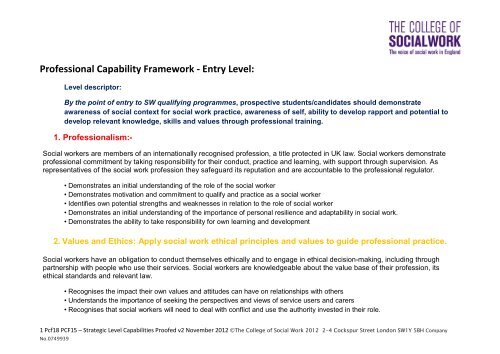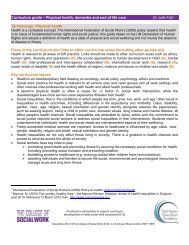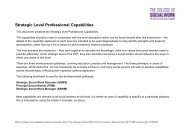PCF capabilities - entry level - The College of Social Work
PCF capabilities - entry level - The College of Social Work
PCF capabilities - entry level - The College of Social Work
Create successful ePaper yourself
Turn your PDF publications into a flip-book with our unique Google optimized e-Paper software.
Pr<strong>of</strong>essional Capability Framework - Entry Level:<br />
Level descriptor:<br />
By the point <strong>of</strong> <strong>entry</strong> to SW qualifying programmes, prospective students/candidates should demonstrate<br />
awareness <strong>of</strong> social context for social work practice, awareness <strong>of</strong> self, ability to develop rapport and potential to<br />
develop relevant knowledge, skills and values through pr<strong>of</strong>essional training.<br />
1. Pr<strong>of</strong>essionalism:-<br />
<strong>Social</strong> workers are members <strong>of</strong> an internationally recognised pr<strong>of</strong>ession, a title protected in UK law. <strong>Social</strong> workers demonstrate<br />
pr<strong>of</strong>essional commitment by taking responsibility for their conduct, practice and learning, with support through supervision. As<br />
representatives <strong>of</strong> the social work pr<strong>of</strong>ession they safeguard its reputation and are accountable to the pr<strong>of</strong>essional regulator.<br />
• Demonstrates an initial understanding <strong>of</strong> the role <strong>of</strong> the social worker<br />
• Demonstrates motivation and commitment to qualify and practice as a social worker<br />
• Identifies own potential strengths and weaknesses in relation to the role <strong>of</strong> social worker<br />
• Demonstrates an initial understanding <strong>of</strong> the importance <strong>of</strong> personal resilience and adaptability in social work.<br />
• Demonstrates the ability to take responsibility for own learning and development<br />
2. Values and Ethics: Apply social work ethical principles and values to guide pr<strong>of</strong>essional practice.<br />
<strong>Social</strong> workers have an obligation to conduct themselves ethically and to engage in ethical decision-making, including through<br />
partnership with people who use their services. <strong>Social</strong> workers are knowledgeable about the value base <strong>of</strong> their pr<strong>of</strong>ession, its<br />
ethical standards and relevant law.<br />
• Recognises the impact their own values and attitudes can have on relationships with others<br />
• Understands the importance <strong>of</strong> seeking the perspectives and views <strong>of</strong> service users and carers<br />
• Recognises that social workers will need to deal with conflict and use the authority invested in their role.<br />
1 Pcf18 <strong>PCF</strong>15 – Strategic Level Capabilities Pro<strong>of</strong>ed v2 November 2012 ©<strong>The</strong> <strong>College</strong> <strong>of</strong> <strong>Social</strong> <strong>Work</strong> 2012 2-4 Cockspur Street London SW1Y 5BH Company<br />
No.0749939
3. Diversity: Recognise diversity and apply anti-discriminatory and anti-oppressive principles in practice<br />
<strong>Social</strong> workers understand that diversity characterises and shapes human experience and is critical to the formation <strong>of</strong> identity.<br />
Diversity is multi- dimensional and includes race, disability, class, economic status, age, sexuality, gender and transgender, faith<br />
and belief. <strong>Social</strong> workers appreciate that, as a consequence <strong>of</strong> difference, a person’s life experience may include oppression,<br />
marginalisation and alienation as well as privilege, power and acclaim, and are able to challenge appropriately.<br />
• Demonstrates an initial understanding <strong>of</strong> difference and diversity within society and the implications <strong>of</strong> this for social work practice.<br />
• Is receptive to the views <strong>of</strong> others.<br />
4. Rights, Justice and Economic Wellbeing:<br />
Advance human rights and promote social justice and economic well-being<br />
<strong>Social</strong> workers recognise the fundamental principles <strong>of</strong> human rights and equality, and that these are protected in national and<br />
international law, conventions and policies. <strong>The</strong>y ensure these principles underpin their practice. <strong>Social</strong> workers understand the<br />
importance <strong>of</strong> using and contributing to case law and applying these rights in their own practice. <strong>The</strong>y understand the effects <strong>of</strong><br />
oppression, discrimination and poverty.<br />
• Recognises the contribution <strong>of</strong> social work to promoting social justice, inclusion and equality<br />
• Is receptive to the idea that there may be conflicts in the social work role between promoting rights and enforcing responsibilities<br />
5. Knowledge: Apply knowledge <strong>of</strong> social sciences, law and social work practice theory<br />
<strong>Social</strong> workers understand psychological, social, cultural, spiritual and physical influences on people; human development<br />
throughout the life span and the legal framework for practice. <strong>The</strong>y apply this knowledge in their work with individuals, families<br />
and communities. <strong>The</strong>y know and use theories and methods <strong>of</strong> social work practice.<br />
• Identify how own learning (formal, informal and experiential) contributes to understanding the social work role.<br />
2 Pcf18 <strong>PCF</strong>15 – Strategic Level Capabilities Pro<strong>of</strong>ed v2 November 2012 ©<strong>The</strong> <strong>College</strong> <strong>of</strong> <strong>Social</strong> <strong>Work</strong> 2012 2-4 Cockspur Street London SW1Y 5BH Company<br />
No.0749939
6. Critical reflection and Analysis - Apply critical reflection and analysis to inform and provide a rationale for<br />
pr<strong>of</strong>essional decision-making<br />
<strong>Social</strong> workers are knowledgeable about and apply the principles <strong>of</strong> critical thinking and reasoned discernment. <strong>The</strong>y identify, distinguish,<br />
evaluate and integrate multiple sources <strong>of</strong> knowledge and evidence. <strong>The</strong>se include practice evidence, their own practice experience, service user<br />
and carer experience together with research-based, organisational, policy and legal knowledge. <strong>The</strong>y use critical thinking augmented by<br />
creativity and curiosity.<br />
• Demonstrates an ability to reflect on and analyse own experience (educational, personal, formal and informal<br />
• Demonstrates curiosity and critical thinking about social issues<br />
7. Intervention and Skills: Use judgement and authority to intervene with individuals, families and communities<br />
to promote independence, provide support and prevent harm, neglect and abuse<br />
<strong>Social</strong> workers engage with individuals, families, groups and communities, working alongside people to assess and intervene. <strong>The</strong>y enable<br />
effective relationships and are effective communicators, using appropriate skills. Using their pr<strong>of</strong>essional judgement, they employ a range <strong>of</strong><br />
interventions: promoting independence, providing support and protection, taking preventative action and ensuring safety whilst balancing rights<br />
and risks. <strong>The</strong>y understand and take account <strong>of</strong> differentials in power, and are able to use authority appropriately. <strong>The</strong>y evaluate their own<br />
practice and the outcomes for those they work with.<br />
• Communicates clearly, accurately and appropriately to the <strong>level</strong> <strong>of</strong> training applied for, in verbal and written forms<br />
• Demonstrates an ability to engage with people with empathy’<br />
8. Contexts and organisations: Engage with, inform, and adapt to changing contexts that shape practice.<br />
Operate effectively within own organisational frameworks and contribute to the development <strong>of</strong> services and<br />
organisations. Operate effectively within multi-agency and inter-pr<strong>of</strong>essional partnerships and settings<br />
<strong>Social</strong> workers are informed about and pro-actively responsive to the challenges and opportunities that come with changing social contexts and<br />
constructs. <strong>The</strong>y fulfil this responsibility in accordance with their pr<strong>of</strong>essional values and ethics, both as individual pr<strong>of</strong>essionals and as members<br />
<strong>of</strong> the organisation in which they work. <strong>The</strong>y collaborate, inform and are informed by their work with others, inter-pr<strong>of</strong>essionally and with<br />
communities.<br />
3 Pcf18 Strategic Level Capabilities Pro<strong>of</strong>ed v2 November 2012 ©<strong>The</strong> <strong>College</strong> <strong>of</strong> <strong>Social</strong> <strong>Work</strong> 2012 2-4 Cockspur Street London SW1Y 5BH Company No.0749939
• Demonstrates understanding <strong>of</strong> importance <strong>of</strong> working as a member <strong>of</strong> a team and an organisation<br />
9. Pr<strong>of</strong>essional Leadership: Take responsibility for the pr<strong>of</strong>essional learning and development <strong>of</strong> others through<br />
supervision, mentoring, assessing, research, teaching, leadership and management<br />
<strong>The</strong> social work pr<strong>of</strong>ession evolves through the contribution <strong>of</strong> its members in activities such as practice research, supervision, assessment <strong>of</strong><br />
practice, teaching and management. An individual’s contribution will gain influence when undertaken as part <strong>of</strong> a learning, practice-focused<br />
organisation. Learning may be facilitated with a wide range <strong>of</strong> people including social work colleagues, service users and carers, volunteers,<br />
foster carers and other pr<strong>of</strong>essionals.<br />
• Recognises how own learning, behaviour and ideas can influence and benefit others<br />
4 Pcf18












